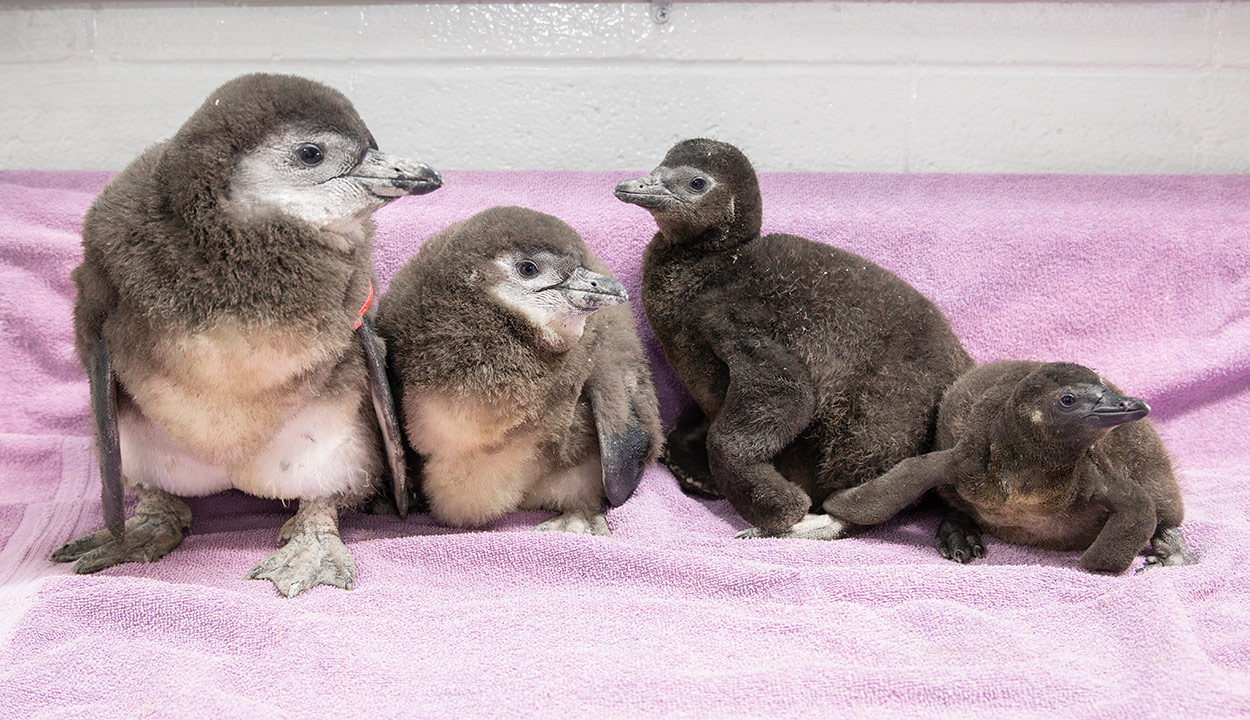
BOSTON, MASS. (May 9, 2024) – Just in time for Mother’s Day, the New England Aquarium is pleased to announce the hatching of four African penguin chicks that are being cared for behind the scenes.
**PHOTOS AND VIDEO AVAILABLE HERE WITH CREDIT TO NEW ENGLAND AQUARIUM**
The first chick, a male, hatched at the Aquarium on March 21, 2024, followed by a female from the same parents—Malgas II and Demersus III—on March 27. In the following weeks, two eggs hatched from parents Namibia IV and Jahleel III. One male and one female hatched on April 8 and April 18, respectively.
Malgas is an experienced mother who has now raised six chicks over the years, including “Bray,” who hatched at the Aquarium in 2023. The Animal Care team noted that she was even seen helping pull away the eggshell as the recent chicks were hatching and went seamlessly into her parental duties, ensuring the chicks were well-fed.
“What’s really exciting about Malgas this year is that she got to raise two chicks. In the wild, one of those chicks may not survive because of competition for the resources of its parents. But Malgas was clearly ready for this challenge, and both chicks are thriving,” said Eric Fox, assistant curator of penguins.
Namibia is a first-time mom who has been learning how to care for her chicks. Staff brought in experienced penguin parents to “foster” the eggs during their incubation period, and trainers have given her time to learn by assisting with supplemental feedings for her second chick and brought in an experienced foster mom, Harlequin, to raise the second chick. Staff have been monitoring the chicks’ weight closely, which helps determine if they are growing at the expected pace and being appropriately fed by their parents.
While the chicks are close in age, their size differences are striking due to the rapid growth of young penguins. Malgas and Demersus’ first chick to hatch is already the size of an adult at 2,500 grams—35 times its hatch weight. The chick and his sibling are weaned and now hand fed, with their waterproof feathers starting to come in, which will allow them to enter the water and practice swimming. In the meantime, trainers are working with the penguin chicks to become more comfortable with handling and husbandry behaviors so that staff can inspect their feet, mouths, and bodies with minimal stress to the birds.
“It is nuanced work, with small steps that allow us to develop a level of trust with the chicks,” Fox said.
Staff also plan to introduce each chick to other adult penguins in the colony as part of the acclimation process. The first chick will likely be ready to go on exhibit for the public to see in early June. In the coming weeks, each of the newly hatched chicks will receive a name with an educational or conservation tie before they join the rest of the Aquarium’s colony.
African penguins are an endangered species. Colonies along the coasts of South Africa and Namibia are threatened by the depletion of food from overfishing, climate change, and pollution. The Aquarium recently joined the Association of Zoos and Aquariums (AZA) SAFE African Penguin program, an international effort to protect and restore wild African penguin populations. The Aquarium also participates in the AZA’s African Penguin Species Survival Plan, which supports field conservation efforts and a breeding program to help promote a sustainable future for these endangered penguins.
A lot of thoughtful planning goes into each penguin breeding season at the Aquarium. Breeding pairs are carefully selected based on a variety of factors including age, genetic diversity, and experience. The process gives penguins in human care a chance to go through an important life stage—pair-bonding, nesting, breeding, and rearing.
“The breeding process is not only a great learning opportunity for the staff but also for the birds,” said Kristen McMahon, the Aquarium’s curator of pinnipeds and penguins.
The last time the Aquarium introduced multiple African penguin chicks in the same breeding season was 2019 when three chicks joined the colony.
MEDIA CONTACT: Pam Bechtold Snyder, psnyder@neaq.org; 617-686-5068
